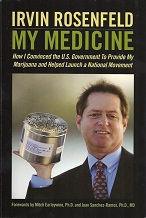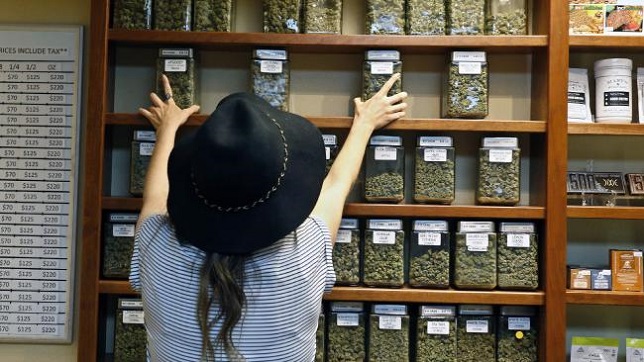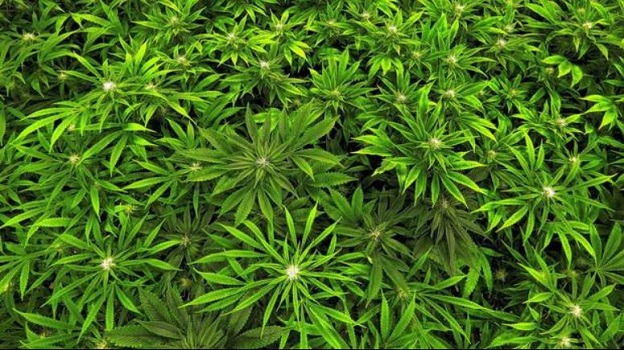Study: Cannabinoids a Safe and Effective Treatment for Tourette syndrome
 Cannabinoids are a safe and effective treatment for Tourette syndrome, a new study published in the journal Australian Psychiatry has found. According to the Mayo Clinic Tourette syndrome is a nervous system disorder that often involves “uncontrollable repetitive movements or unwanted sounds (tics), such as repeatedly blinking the eyes,...
Cannabinoids are a safe and effective treatment for Tourette syndrome, a new study published in the journal Australian Psychiatry has found. According to the Mayo Clinic Tourette syndrome is a nervous system disorder that often involves “uncontrollable repetitive movements or unwanted sounds (tics), such as repeatedly blinking the eyes,...
cannabis and paranoia
Many people will attest to the potential for cannabis to trigger paranoia and anxiety, while many others will attest to the benefits they receive in reducing anxiety and battling similar symptoms.
The contrasting experiences different people report, and the contrasting experiences the same people report at different times, is evidence of the complicated relationship between cannabis and the brain, especially when dealing with emotional reactions.
Cannabinoid receptors are abundant in the brain, including many in the amygdala, which is associated with emotional responses, like fear, stress, anxiety and paranoia.
Just as many recreational users will attest to the potential for cannabis to trigger or exasperate paranoia and anxiety, many PTSD patients, among others, can attest to the potential for cannabis to relieve these very symptoms.
The Endo Cannabinoid System is heavily involved in maintaining mental health, which is why cannabis can be very useful in treating mental health problems in some situations, but is also part of the reason why it can induce negative responses in people.
If your body is not producing sufficient cannabinoids to keep your brain healthy then cannabis may prove a valuable medicine, especially for relieving symptoms and even as part of a treatment, however if the problem is not as simple as a cannabinoid deficiency or involves an imbalance that cannot be rectified by cannabinoids then cannabis may be ineffective or even detrimental, at least regarding its immediate effects.
Unlike other medicines, there are no real dangers of tangible harm from exposing the brain to large doses of cannabinoids, but it may not be what is actually required and as a result may provoke undesirable reactions, with negative emotional responses that include paranoia.
One thing that has been heavily suggested by the anecdotal reports of cannabis causing paranoia is that personal circumstances appear to be equally relevant, if not more so, than the cannabis.
Different strains may bring about different responses, but also different people and the same people but in different circumstances all give different results.
It is not always easy to pin down the deciding factors but obvious variables are sometimes evidenced in different experiences people report.
For example, a common report from many people who smoke cannabis have reported paranoia only when in a situation they were already uncomfortable or where a looming threat exists, like smoking in an area where police may potentially catch and arrest you. Whereas smoking in their own home or with friends they trust, or in a place where criminalisation is not an issue (like a coffee shop in Amsterdam) rarely involves such symptoms.
These experiences lend a lot of weight to the idea that, rather than outright causing feelings like paranoia or anxiety,
cannabis simply heightens these feelings and/or brings them to the surface, often to the point that it can feel like an outright manifestation.
Another factor that appears significant, according to many reports, is the cannabinoid (and even the terpene) profile of a specific strain. A common report is that strains with large CBD content (not necessarily higher than THC but close to equal at least) is far less likely to induce paranoia and/or anxiety than strains that are very high THC with very little, or no significant quantities of, CBD.
Just as the Endo Cannabinoid System (ECS) produces and utilises different Endo Cannabinoids for a variety of purposes the different cannabinoids in cannabis provide different therapeutic effects, some of which will be profoundly beneficial, some of which will be benign and some of which can even be detrimental (though not actively harmful).
The simple truth is we do not know with a 100% established certainty why cannabis triggers or exasperates paranoia but we can infer from what we do know that the more compelling factors to such symptoms are the underlying issues, the predisposition of the person and their environment, circumstances and mental/emotional state.
Though it cannot be ignored that many people have reported feeling paranoia when using cannabis, while insisting there is no other potential reason for such effects, it also cannot be ignored that many people have reported very different experiences when their circumstances change. Add to the that the unquestionable benefit cannabis can provide to many sufferers of many different types of mental problems, including (but not limited to) schizophrenia, bi polar disorder, PTSD, severe anxiety, acute depression and paranoia.
Just as the interaction between cannabinoids and the cannabinoid receptors in our brain can be used to prevent seizures in sufferers of epilepsy, cannabinoids can also be useful for addressing imbalances that contribute to or cause other problems in the brain.
The same network that can relieve severe anxiety in many people also increase it in others, or even in the same person in different circumstances. And like with epilepsy some cannabinoids can be more useful than others and as such the cannabinoid profile has great importance.
When it comes to paranoia in particular, there are so many factors that play a role and so many varying and contrasting experiences that it is impossible to say with 100% certainty why some people experience paranoia every time they use cannabis, while others experience it only from certain strains, or in different circumstances, and many more people simply never experience paranoid feelings from any forms of cannabis during any situations.
Legal marijuana: California dreaming of joining US revolution
Sunshine Johnson has been quietly growing marijuana in the hippie heartlands of northern California for 30 years yet she can’t decide whether to vote for or against legalising recreational sales of the drug.
The Golden State boasts an economy that would be the sixth-largest in the world if it were an independent nation. If, as expected, its residents endorse legalisation at the ballot box on November 8 analysts predict it could be a tipping point in the dismantling of marijuana bans in America and beyond.
“If it doesn’t pass then it could be kind of a bummer,” said Ms Johnson, who runs the Sunboldt Grown co-operative producing legal, organic medical marijuana in Humboldt county, north of San Francisco.
Defeat would kill the momentum of the campaign to legalise marijuana across the US and limit the prospects for existing businesses to expand. But if the law passed Ms Johnson is dreading further incursions into the market by those who “just want to make money and aren’t coming with principles and values”.
That process is already under way, with speculators behaving “like multinational corporations in a third-world country”, she said, buying up land all over Humboldt county, famed for its towering redwood forests, its counter-culture vibe and the quality of its pot.
California was the first state to legalise the cultivation of limited amounts of non-commercial marijuana for medical use, in 1996. Since then half the states in the US have followed suit. Last year the Californian marijuana industry was worth $US2.7 billion ($4bn), half the US legal market. That figure is expected to double by 2020 if recreational marijuana is legalised, dwarfing the isolated markets in the four states that already have fully legal pot, and placing pressure on the federal government to relax the national prohibition on the drug.
Colorado was the first to pass laws legalising and regulating the recreational cannabis business. Alaska, Oregon, Washington and the District of Columbia followed.
Arizona, Nevada, Maine and Massachusetts are also voting on recreational marijuana sales this year.
Mason Tvert, communications director for the Marijuana Policy Project, said there was a real chance the law could be relaxed. Sitting in a cafe in Denver, Colorado, next to a poster for the 1936 propaganda film Reefer Madness — in which teenagers become hooked on marijuana and have their lives ruined — he said the battles ahead were likely to be hard fought.
“We are dealing with Reefer Madness 2.0, geared towards making it seem legal marijuana is scary. The folks that want marijuana to be illegal are doing everything they can to make it sound like it’s fire and brimstone here, when in reality it’s working incredibly well.”
All over California, businesses, investors and even some cash-strapped cities are preparing for the emergence of a regulated, legal large-scale market in medical and recreational marijuana agriculture. For the moment the commercial industry exists in a haze of legal confusion that only began to clear last October when Governor Jerry Brown signed a law that will allow farmers to turn a profit on medical marijuana sales and eliminate limits on the number of plants they can grow. But recreational marijuana sales would be a huge step beyond that.
“We are really, really excited,” said Matthew Feinstein, chief executive of Pineapple Express, a marijuana marketing, consulting and business development company based in Los Angeles. It aims to set up a nationwide chain of marijuana shops and cultivation centres once the industry is fully legal at the federal level. Mr Feinstein, who used to own a national chain of DVD rental shops, assumes that will be in “about two or three years”.
At that point he expects the big pharmaceutical and tobacco companies to charge into the industry, but by then “we will already have made our mark”.
Work is already under way on the first Pineapple Park, a complex of 10 rentable warehouses kitted out for growing marijuana in Desert Hot Springs. The city is one of several pinning their hopes on a marijuana boom to yank them out of economic decline.
references: The Times
http://www.theaustralian.com.au/news/world/the-times/legal-marijuana-california-dreaming-of-joining-us-revolution/news-story/92538bdc3ca43c7e7aef755d03ccd597
Smart thinking Canada! easing its prohibitions against safety testing
Health Canada is easing its prohibitions against safety testing of medical marijuana, which will allow registered growers and patients to have the product scrutinized at federally certified laboratories to ensure it is safe.
Latest
Coronavirus Strikes Massachusetts Cannabis Company Employees
Reassessing the Essential: Cannabis in the Time of a Pandemic
5 Reasons To Try Aspen Valley CBG Flower (30% Off)
High Times Cannabis Cups Go Virtual In Wake Of Coronavirus Pandemic
Drug Enforcement Administration Proposes Plan To Expand Cannabis Research
Ghana Legalizes Cannabis For Medicinal And Industrial Uses
The cheapest legal weed in Canada: Discover these cannabis ‘value brands’
Cannabis and coronavirus: Here’s what you need to know
cannabis designs
The Best Of
WHO Rules CBD Should Not Be a Scheduled Drug

Dr Cristina Sanchez PhD video interview on medical marijuana and cancer

Biochemist Dennis Hill interview; Cannabis oil as a cure for cancer.

The unofficial World Record holder for cannabis smoking part 1







